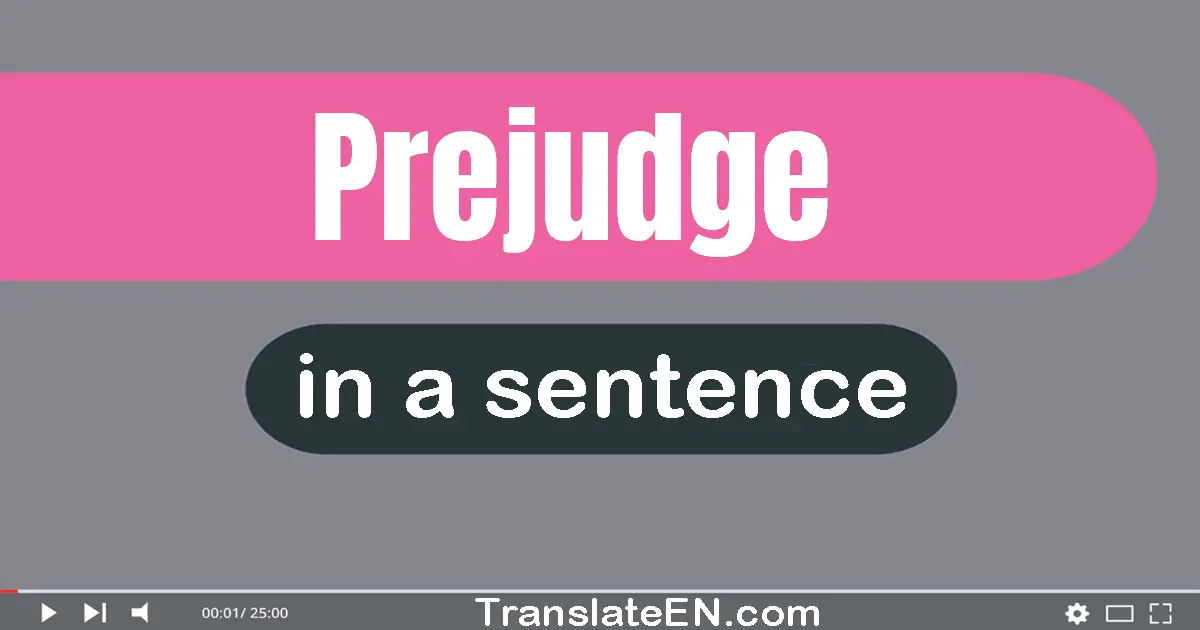Prejudge in a sentence
Synonym: assume.
Meaning: To form an opinion before knowing all the facts.

(1) It is unfair to prejudge someone based on their appearance.
(2) It is unfair to prejudge someone based on their appearance alone.
(3) Let's not prejudge the outcome of the game before it even starts.
(4) We should not prejudge someone's abilities based on their gender.
(5) We should not prejudge a situation without knowing all the facts.
(6) We should not prejudge someone's worth based on their occupation.
(7) It's important not to prejudge someone based on their appearance.
(8) It is important to challenge our own biases and not prejudge others.
(9) It is best to reserve judgment and not prejudge someone's intentions.
(10) Let's not prejudge someone's cooking skills without tasting their food.
Prejudge sentence
(11) We should not prejudge someone's potential based on their past mistakes.
(12) Let's not prejudge someone's taste in music without listening to it first.
(13) Let's not prejudge someone's intelligence based on their choice of hobbies.
(14) It is important to give people the benefit of the doubt and not prejudge them.
(15) It's unfair to prejudge someone's character without getting to know them first.
(16) Let's not prejudge the outcome of the election before all the votes are counted.
(17) We should not prejudge someone's abilities based on their educational background.
(18) Let's not prejudge the outcome of the trial before all the evidence is presented.
(19) It is important to approach each situation with an open mind and not prejudge it.
(20) It is important to approach each new experience with an open mind and not prejudge it.
Prejudge make sentence
(21) Let's not prejudge someone's taste in fashion without considering their personal style.
(22) We should never prejudge someone's mental health without understanding their struggles.
(23) We should strive to be unbiased and not prejudge people based on their race or ethnicity.
(24) It is important to treat everyone with respect and not prejudge them based on their race.
(25) It is important to approach each situation with an open mind and not prejudge the outcome.
(26) Let's not prejudge the outcome of the project before we have all the necessary information.
(27) We should not prejudge someone's abilities without giving them a chance to prove themselves.
(28) It is best to reserve judgment and not prejudge a person until we have interacted with them.
(29) We should never prejudge someone's family background without understanding their experiences.
(30) We should never prejudge someone's abilities without giving them a chance to prove themselves.
(31) It is important to give people a fair chance and not prejudge them based on their social circle.
(32) It is important to give everyone a fair chance and not prejudge them based on their past mistakes.
(33) It is important to treat everyone with respect and not prejudge them based on their social status.
(34) It is important to approach each new opportunity with an open mind and not prejudge its potential.
(35) It is important to give everyone a fair chance and not prejudge them based on their family background.
Prejudge meaning
Prejudge is a verb that refers to forming an opinion or making a judgment about someone or something before having all the necessary information or facts. It involves making assumptions or having preconceived notions based on limited knowledge or personal biases. To effectively use the word "prejudge" in a sentence, consider the following tips:
1. Understand the meaning: Before using the word "prejudge" in a sentence, it is crucial to have a clear understanding of its definition. This will help you use it appropriately and convey your intended message accurately.
2. Contextualize the sentence: Consider the context in which you want to use the word "prejudge." Is it in a formal or informal setting? Is it related to a specific topic or situation? Understanding the context will help you construct a sentence that is relevant and meaningful.
3. Use it in a sentence: Once you have a clear understanding of the word and its context, you can construct a sentence that effectively incorporates "prejudge." Here are a few examples: - "It is unfair to prejudge someone based on their appearance alone." - "We should not prejudge the outcome of the investigation until all the evidence is presented." - "She was determined not to prejudge the new employee's abilities and gave him a fair chance to prove himself." - "It is important to approach each situation with an open mind and not prejudge others based on stereotypes." - "The judge reminded the jury not to prejudge the defendant and to consider all the evidence presented in court."
4. Consider synonyms or related words: If you find it challenging to incorporate "prejudge" into a sentence, you can explore synonyms or related words that convey a similar meaning. Some alternatives include "preconceive," "prejudge," "prejudge," or "prejudge."
5. Proofread and revise: After constructing a sentence using "prejudge," it is essential to proofread and revise it for clarity, grammar, and coherence. This step ensures that your sentence effectively conveys your intended message and adheres to proper language usage.
In conclusion, using the word "prejudge" in a sentence requires a clear understanding of its meaning, consideration of the context, and the ability to construct a sentence that effectively conveys your message. By following these tips, you can confidently incorporate "prejudge" into your writing or conversation.
The word usage examples above have been gathered from various sources to reflect current and historical usage of the word Prejudge. They do not represent the opinions of TranslateEN.com.
